I thought I had it all figured out. I had just graduated from college and had successfully made it to Iceland with all the gear I needed. I had a family and a girlfriend who supported this trip. I had a job offer for when I would return, and I had saved enough money to be entirely independent for the first time in my life. It was intoxicating, like botox for the upper lip of my ego. I had it all figured out.
Yet, within my first week in Iceland, I realized that wasn't true. I realized that the $270 backpack I had bought online didn't fit me correctly. It was too long, and the hip-straps hung around my waist. (I’ve half-fabricated the memory that I had accidentally clicked the wrong button, but the truth is that I intentionally clicked "long" instead of "regular" because of the inflated fat lip of my ego. The "long" version, as I learned, is for people who are 6'5", not 5'11".) I also realized that my quantitative finance degree didn't prepare me to measure liquids with the metric system. Deciliters confused me, and I tried to cook a packet of tomato soup with a tenth of the water it called for. The soup-powder burned and stained the bottom of my $88 JetBoil, a stain that stayed there for the remainder of the summer. And I realized that, even though I was packing a $30 ultralight aluminum trowel, I had no idea how I was supposed to drop a deuce without a toilet.
There's nothing more humbling then realizing you don't know how to shit. Am I a fully functioning adult capable of navigating the Icelandic wilderness? Or am I merely a waddling toddler who needs to be told where to place his doo-doo?
Shit's About to Get Deep
The first book I read in Iceland was Milan Kundera's The Unbearable Lightness of Being. And the most valuable thing I took from it was this lexicon of the light and heavy (fire and ice). It was this idea that life exists within a duality of these two extremes, and that it's dangerous to run from the heavy toward ultimate lightness, lest you share the fate of Icarus. We long to be free of all burdens, but our burdens and commitments are what give life meaning. "The heavier the burden, the closer our lives come to the earth, the more real and truthful they become." Instead of running from all burdens, we must choose some, for "the absolute absence of burden causes man to be lighter than air, to soar into heights, take leave of the earth and his earthly being." This is the unbearable lightness of being; when you have no burdens or commitments to ground you, you become only half real and detached from the earth, your "movements as free as they are insignificant."1
The most visceral manifestation of this duality is the day-to-day confrontation of our rational minds and our animal bodies. We humans have infinite concepts of what life could be, yet we are bound to the finite concrete of reality. Or, in fewer, more crass terms, we think like gods and shit like dogs. Our inescapable identities as human-animals is something Kundera explores throughout the book, through sex and shit and our other animal-like operations.
Tomás, the main character of Unbearable Lightness, can't reconcile the fact of shit with the Christian doctrine that we were made in the image of God. And he is unable to accept Christianity on the basis that shit is the furthest thing from God:
Spontaneously, without any theological training, I, a child, grasped the incompatibility of God and shit and thus came to question the basic thesis of Christian anthropology, namely that man was created in God’s image. Either/or: either man was created in God’s image—and has intestines!—or God lacks intestines and man is not like him.
If God shits like us, how could He possibly be God? And if God is benevolent, why would He endow us with intestines?
Shit is a more onerous theological problem than is evil. Since God gave man freedom, we can, if need be, accept the idea that He is not responsible for man’s crimes. The responsibility for shit, however, rests entirely with Him, the creator of man.
All this shit-talking might seem like a joke, but Kundera is serious about the questions he's raising (and so am I). He's illuminating this daily confrontation between our divine minds and our disgusting dookies. It's a contradiction that we avoid and overlook by flushing our shits into Tartarus from the comfort of porcelain thrones, never having to deal with their stench.
Kundera says that we all implicitly understand the incompatibility of shit and God, and in an effort to bring ourselves closer to Him, we deny the fact of shit entirely. Kundera uses "kitsch," an old German word, to describe this attitude, but he calls on it's original, metaphysical meaning — not what it has come to mean today: having an ironic taste for cheap, low art, like thrifting for pop-culture trinkets or having a hoarder-streak for Furbies.
Kundera's "kitsch" is the aesthetic impulse toward anything that is easy to like, like children playing on a playground beneath a blue sky or an immaculately plated Michelin-star meal. It is the attitude that you can find no beauty in the slums or dirt or dookies. For Kundera, "kitsch is the absolute denial of shit," the attitude that nothing worth seeing stinks. "Kitsch excludes everything from its purview which is essentially unacceptable in human existence." The metaphysical meaning of kitsch is to absolutely deny whatever you wish weren't part of the human reality, even if — like shit — it is essential and inescapable.
This idea of kitsch stuck with me, along with Tomás's whole line of questioning about shit. At first, it seemed true and sound. Then I started to doubt his foundational assumption, that shit is the furthest thing from God. How could shit be so far from God if we are so near to God and shit is such a fundamental part of who we are? When I finished Kundera's book in the common area of the Reykjavik campsite, I had no idea that I would soon prove Tomás wrong. For, as I learned a week later in the Icelandic highlands, sometimes shit can bring you closer to God.
"I Have It All Figured Out"
On Day 2, while I was reading Kundera, I saw another solo traveller sitting in the campsite's kitchen, and I started up a conversation. Ten minutes later, Jared and I had agreed to hike together. He was a backpacking guide on a two-week training trip, and I was a first-time backpacker. Jared needed someone to teach, and I had a lot to learn.
Tomorrow, I'll have to brainstorm some good questions for Jared — about life, his life, and about backpacking, of course. Maybe he can solve my elusive poop problem.2
Jared is a Phoenix-born world traveler and a new hire at the National Outdoor Leadership School (NOLS), but that's only his current focus. He's also a virtuoso musician (piano and trumpet), a trained firefighter and EMT, formerly a competitive gymnast, and a rock climber. Jared is 21 years old. He sleeps on a tarp beneath a teepee tent when it's rainy but prefers to cowboy-camp. He doesn't use a sleeping pad, and before or after every hike, he does a body-weight workout in the grass. In his pack was not only what he needed for his two weeks in Iceland but also everything he needed to lead a group on a ten-day trip through Alaska. He would fly directly there from Reykjavik. Jared's dream is to become a smoke jumper in Montana and serve as the first line of attack on wildland wildfires, to control, divert, and extinguish them. The way he talked about it made me see the vision: Jared leaping from the sky alongside an elite team of smoke jumpers who have the camaraderie and hardness of Navy Seals and the conscientiousness of environmental activists.
I had completely lucked out. By some act of Nordic serendipity, my first-ever day of through-hiking was with a certified backpacking guide. Jared and I took a bus from Reykjavik to the first town west on the Ring Road: Akranes. From there, we started hiking along the road toward Borgarnes, knowing we'd stop for the night about halfway there. I thought I had it all figured out, but as soon as we started hiking together, I realized how little I knew. Two miles in, Jared confirmed that my backpack didn't fit, and that no amount of strap-yanking would fix it. During lunch, I learned how few meals I'd be able to cook with just my 500 ml, tomato-soup-stained cup-stove. Jared had a foldable set of cookware, spices, and cured meats. I had trail mix, oatmeal, and ramen.
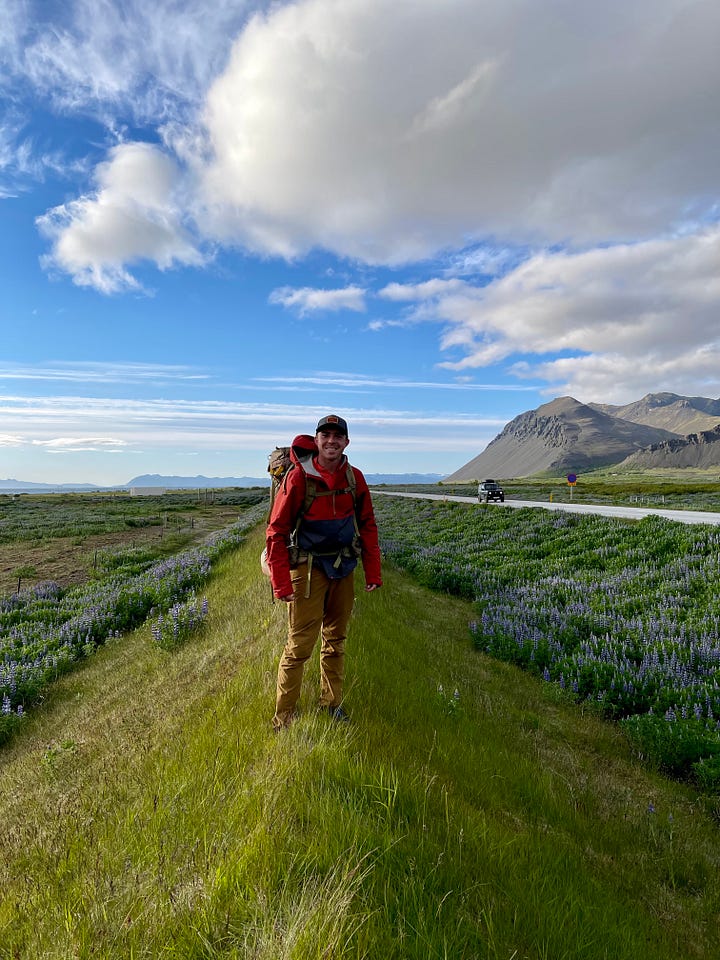
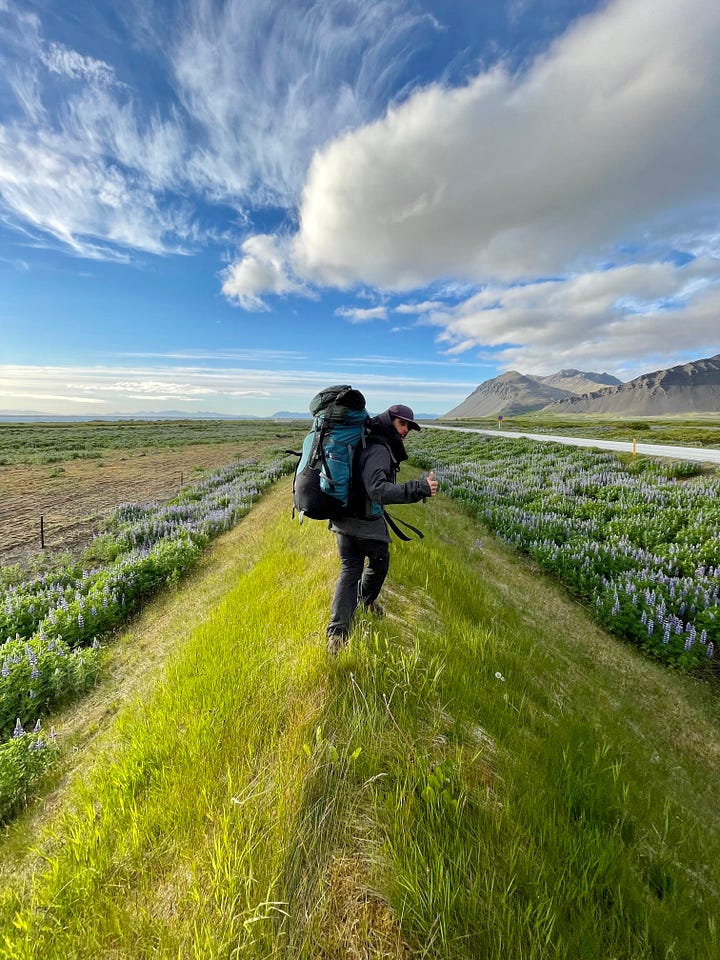
Jared and I walked and gawked at the scenery, and we talked — about the virtue and vices of religion, the fact of death, politics and the decline of civil discourse, whether to make your passion your occupation, how to maintain your individuality, and how to talk to girls. Early on in our hike, Jared delivered his speech on Leave No Trace (LNT) best practices, a requirement of his training. I saw that as my in, the perfect segue: "Speaking of leaving no trace, how do you suggest I shit out here if I'm away from a toilet?"
I knew you had to dig a six-inch hole. That's why I'd bought the $30 ultralight aluminum trowel. My real question was, "How do you wipe?" One of the LNT rules is "Pack It In, Pack It Out," which means that if you use toilet paper, you have to keep the dirty stuff in your pack until you find a trash can, whether it's five miles or five days away. You can't bury it, and you can't litter.
"What do you use instead of toilet paper?" I asked.
"At NOLS, we call it the Backcountry Bidet," Jared said.
As Sage Jared explained this method, clouds parted, and angels descended on sunbeams singing "Hallelujah" in four-part harmony. I'll spare you the details (for now), but the Backcountry Bidet solved my poop problem. It was revelatory. Jared also graced me with a mostly full bottle of Dr. Bronner's soap, which was another backpacking essential I didn't know about. It's highly concentrated soap that fits in a tiny bottle. You just add water to a little drop of it and wipe the suds around any crease that needs cleaning.
Our first day of hiking ended after 13 miles, at a spot we'd chosen near the beach for its vista and seclusion from the road. It was my first time wild-camping, and it was a perfect start to the summer. I pointed to the horizon at the tall mountain on the tip of the distant peninsula and told Jared, "That's Snæfellsjökull. I'll be there in a couple weeks, and I'll hike over that glacier."
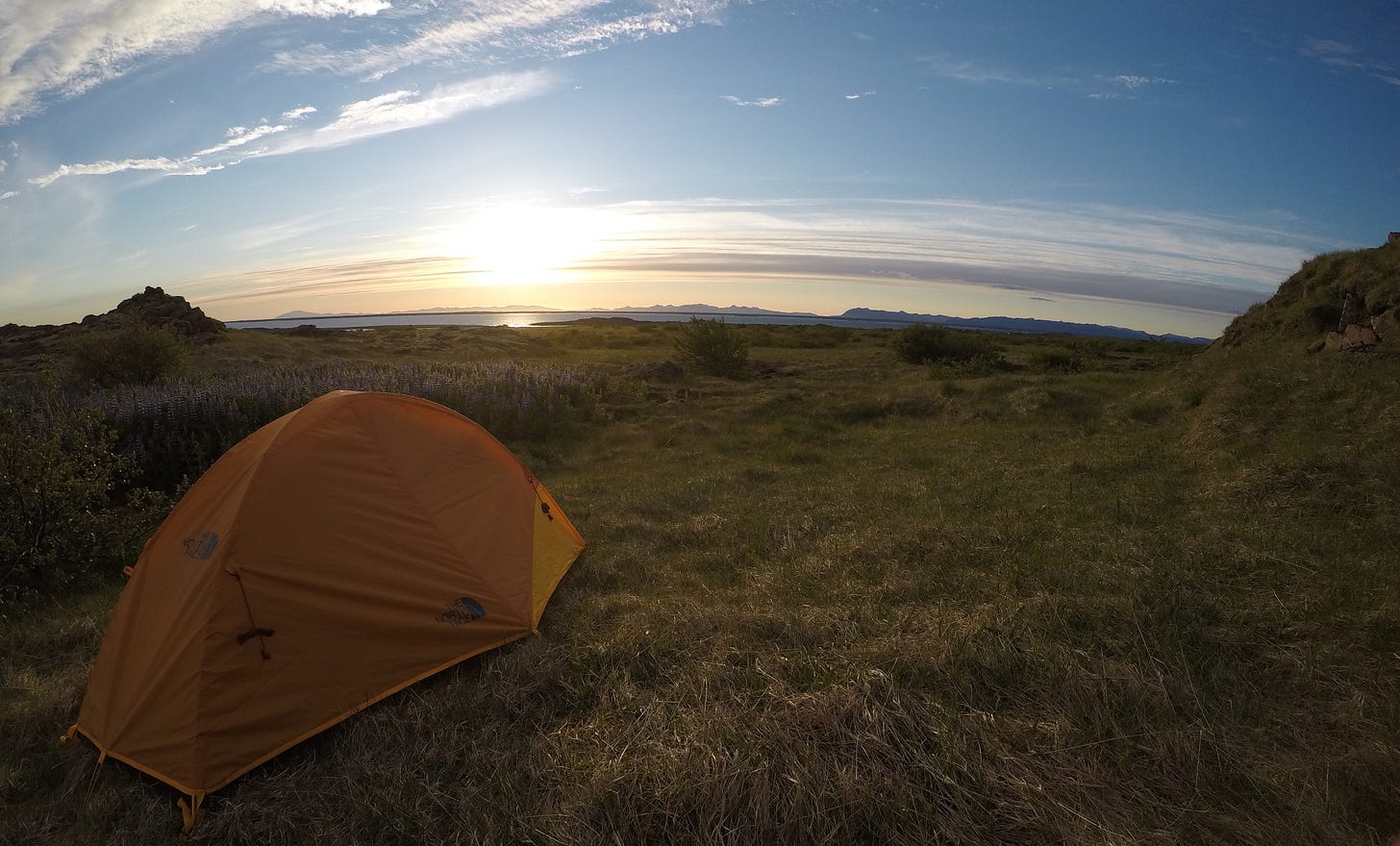
Jared and I hiked another ten miles the next day, arriving at the campsite in Borgarnes after many more staggering views and great conversations. We celebrated and unwound by visiting the pool in town, and we bathed in the geothermal waters for hours. Jared left early the next morning to explore more of Iceland before his trip to Alaska. That morning, on Day 5, was the first time I felt alone, but that feeling was softened by how much I'd learned from Jared and how grateful I was that we'd met. Jared had set me up for a successful summer. He gave me the confidence and knowledge (and the soap) I needed to venture away from the Ring Road and into the highlands, and he encouraged me to get more creative with my meals and campsites. Jared had humbled me, yet what I'd learned from him had filled me with hubris again.
Apolo II: Lunar Landing
Three days later, I was hiking south on the Kaldidalur, one of the unpaved F-roads that run through Iceland's highlands. Like the Icelandic people used to do every year, I was trekking toward Thingvellir, the historic site of the ancient Viking parliament, which sits in the rift-valley between the Eurasian and American tectonic plates — right in the heart of the world. I had completely ditched my plan for June, which was to hike along the Ring Road, so that I wouldn't be walking on the narrow shoulder of a highway anymore, and so that I could find some more silence and solitude. My first day on the Kaldidalur ("cold road"), I only saw two cars and didn't utter a word for hours. The landscape was harsh and exciting. I stopped for lunch along a pristine stream and had spaghetti with a heaping helping of expired pesto. (There was no expiration date on the jar, and the label was written in Danish. So, can you blame me? Yes you can, because I at least knew it said "refrigerate after opening," which I did not do.)
A few hours later, before I'd found a place to camp, I felt the urge. Oh shit. I needed to perform the Backcountry Bidet.
There was a dense fog. It was misting rain with high winds, and I didn't see a good place to pitch my tent. It was late, and I was in a rush. After many minutes of uncomfortable, worried walking, I found a spot with some cover from the wind and dropped my pack on the ground. I grabbed all my supplies and shuffled over to a flat spot in the dirt to dig a six-inch hole with my $30 ultralight aluminum trowel. I set that to the side, next to my Dr. Bronner's soap, my water, and a smooth rock I'd selected. Then I dropped trou completely and set my bottom layers to the side.
EAGLE: "Landing zone clear, all systems go."
CAPCOM: "Apollo Deuce crew, you're go for landing. Assume a sumo-squat position and channel your ape ancestors."
EAGLE: "Roger. All lined up. Landing is a go."
CAPCOM: "Push, you animal!"
EAGLE: "Houston, the Eagle has landed."
Once the Deuce had touched down, I remained in a squat and used the smooth rock to knock off any stragglers and hang-alongs — or, as Jared called them, "chunks." (Yes these are those previously spared "details.") Then I threw the rock into the hole with my lazy Lincoln Logs and continued cleaning myself. This is how the Backcountry Bidet method gets its name. It's similar to using a normal bidet in that you don't need toilet paper. It's different from using a bidet in nearly every other way, because you don't have a bidet or running water, just soap and your hand. Once you’re in position and have chosen which hand you want to defile, the rest is simple: lather, rinse, repeat. This whole time, I was naked below the waist, save my socks and shoes, and I was in view of the road. I would have mooned anyone driving in from the south. And it was cold!
Once I was emptied, clean, and clothed, I must've been more excited than Neil Armstrong was when he took his first steps on the Moon. I hadn't spoken for the whole day, but then, I laughed out loud and cheered. I threw my hands up and spun around and pranced atop the dirt mound that I'd pooped behind, with the wind and rain hitting my face. I had never achieved such a feat of self-reliance. It was a bliss, joy, and pride that I couldn't contain. It was euphoric, even spiritual.
Screw a flag! Mark your territory like the animal you are. Shit on the Moon!
Humbled by the Highlands
My shit was not the furthest thing from God; it was the furthest thing from kitsch. In that moment, I was grateful for life and humbled by Nature. In that moment, I accepted the fact that I am merely a human-animal, bound to the material world as much as I am drawn to heady ideals. By being closer to shit (as close as you can be), I saw the beauty in it, and thereby, more beauty within myself. I'd proved Tomás wrong; sometimes, shit can bring you closer to God. By performing the Backcountry Bidet, I had to acknowledge and accept my identity as a human-animal, and I came out of it with a renewed appreciation for my condition. I saw my earthly existence as a divine gift, exactly as it is. I felt no need to deny the existence of shit. In fact, I was happy to embrace it. It was the opposite of kitsch.
There's nothing more humbling than not knowing how to shit, and there are few things more euphoric than shitting on the Moon.
My first week in Iceland taught me how ignorant I am compared to Jared and how little I actually know about survival. It taught me that I am not separate from shit and that it is dehumanizing to deny it. And it taught me the beauty and freedom that comes from this sort of humility. It's liberating to accept the fact that I am merely a human-animal waddling around, laughing at his own doo-doos. That is all I am and will ever be, and that is precisely enough. I learned that I don't know what I'm doing, and that I can figure it out.
Springboard
A carefully crafted question to help you dive inwards:
What has been a moment in your life of ultimate humility? Was that experience empowering or debilitating, and how would you respond to it differently if it happened today?
This was Chapter I of "Feeling Fire & Ice," a five-part series on my 81 days hiking through Iceland. See the series's contents here. Next is "Majesty and Mortality." Thank you for reading.
Majesty and Mortality
In Iceland, there's a saying: "If you don't like the weather, wait five minutes." Even when you're caught in sideways rain and are miles from shelter, you can find comfort in the idea that the weather might get better in just five minutes. And that's true; it might. You just can't know whether it will.
Footnotes
Milan Kundera, The Unbearable Lightness of Being
An excerpt from my journal entry on Day 2 — June 3, 2022


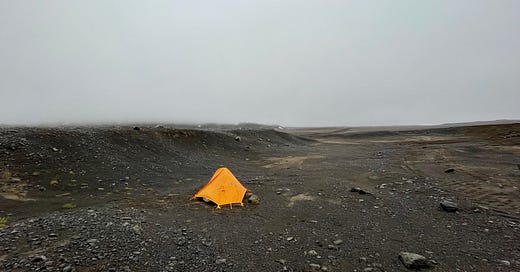


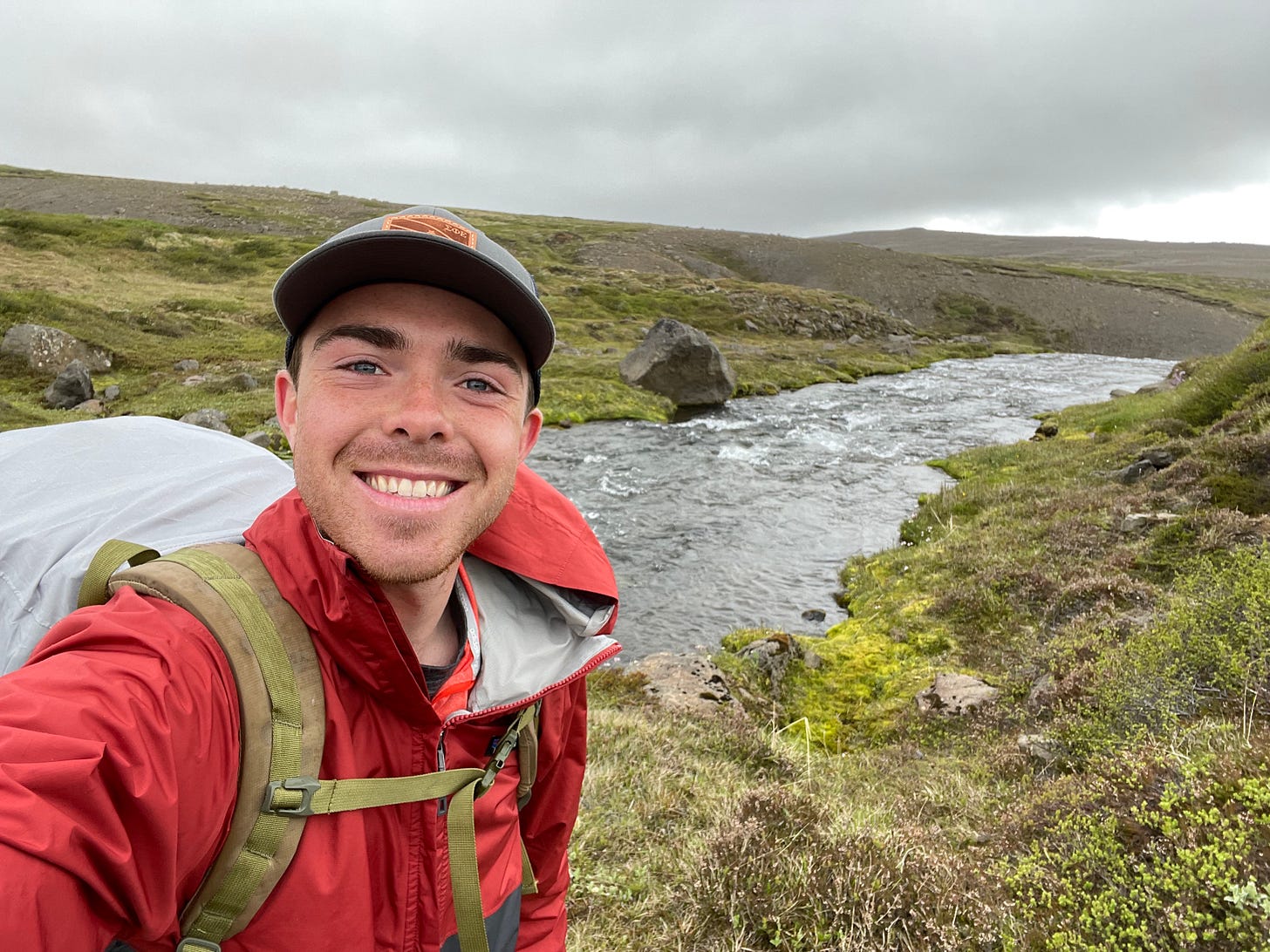

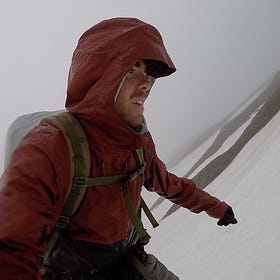
Ah Garrett this was so good & so much fun. Got a bunch of good laughs.
Funny as I cut my teeth on backpacking and going backcountry last summer, how similar our experiences were.
Great work man !
"Am I a fully functioning adult capable of navigating the Icelandic wilderness? Or am I merely a waddling toddler who needs to be told where to place his doo-doo?" ha ha, excellent piece. Well done - great start